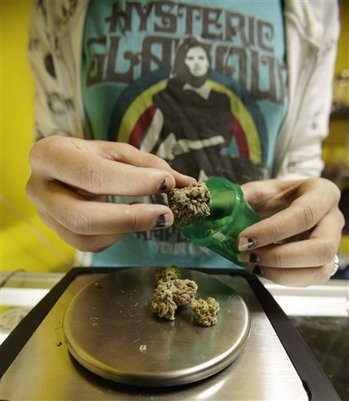U-M researchers to study impacts of medical marijuana use with $2.2M grant
A team at the University of Michigan Medical School has been given a $2.2 million federal research grant to study the use of medical marijuana for pain.
Researchers at U-M hope the study can provide scientific insight to the long-term impacts of medical marijuana use and information as to the types of patients that seek the drug.

Researchers at the University of Michigan have been given $2.2 million to study the use of medical marijuana.
Associated Press file photo
An associate professor in U-M’s Department of Psychiatry, Ilgen is the principal investigator for the research.
More than 135,000 patients in the state are registered medical marijuana users. Michigan is one of 20 states that have legalized marijuana for medical purposes, as well as the District of Columbia.
The four-year grant from the National Institute on Drug Abuse to U-M researchers will fund a study of 800 patients.
Patients cannot volunteer to be a part of the study. The research team will be recruiting patients who are seeking to become a registered medical marijuana user in Michigan by approaching them at their first doctor’s appointment at participating clinics.
Patients that agree to participate will be asked a detailed survey of questions every six months throughout two years. Researchers plan to examine the patients’ symptoms, everyday functions and use of health care services.
“Marijuana is the most frequently used drug in the nation, and has been legalized for medical use in many ways, yet we have very little understanding of how individuals using medical marijuana do over time,” according to a statement from Frederic Blow, a co-investigator on the study.
Blow is a substance abuse researcher who directs the Mental Health Services Outcomes & Translation Section at the Medical School.
Amy Biolchini covers Washtenaw County, health and environmental issues for AnnArbor.com. Reach her at (734) 623-2552, amybiolchini@annarbor.com or on Twitter.


Comments
Mike
Fri, May 31, 2013 : 10:42 a.m.
The impact of medical marijuana is that it makes you feel good. Where do I get some of this grant money?
The Picker
Fri, May 31, 2013 : 12:21 a.m.
The most frequently used drug in the Nation
Michigan Man
Fri, May 31, 2013 : 12:06 a.m.
Medical marijuana is complete oxymoron!. Lung disease, COPD, cancer of the mouth, dental issues, emphysema, etc all documented health consequences of smoking + brain as sharp was as beach ball. In the interest of empirical data, lets see what this study suggests on the outcome side, but most people with 1st grade smarts have a pretty good feel for the findings already.
brb11
Fri, May 31, 2013 : 1:05 p.m.
First grade smarts, indeed.
Blue Marker
Fri, May 31, 2013 : 11:25 a.m.
You needed to meet my late brother who I lost in '10 to stomach cancer. MM made the end of his life much more manageable. Nothing soothed his nauseous stomach like MM. It gave him appetite when nothing else could. So, judge all you want. But maybe you should meet someone dying of cancer first.
Tweezer
Thu, May 30, 2013 : 9:51 p.m.
Does Weltschmertz count as a legally recognized pain?
Mr. Ed
Thu, May 30, 2013 : 4:40 p.m.
I dont think the picture reflects a true picture of a researcher at U of M. But then again maybe it is a researcher. He has some nice bud.
EyeHeartA2
Thu, May 30, 2013 : 6:51 p.m.
He?
Amy Biolchini
Thu, May 30, 2013 : 3:52 p.m.
I'll be interested in seeing the findings from this study, as I'm curious as to what the researchers will be able to garner on the impacts of medical marijuana use from two years of data.
An Arborigine
Thu, May 30, 2013 : 3:27 p.m.
"Blow is a substance abuse researcher" You just couldn't make this stuff up!
Hmm
Thu, May 30, 2013 : 3:26 p.m.
About time...
Billy
Thu, May 30, 2013 : 3:10 p.m.
So um....where do you sign up? See....I have this friend....
Amy Biolchini
Thu, May 30, 2013 : 2:59 p.m.
For those that are as interested as I was: The National Institute on Drug Abuse is funded through congressional appropriations, and is also authorized to accept donations to support research.
jcj
Thu, May 30, 2013 : 5 p.m.
Thanks for the info Amy.
Amy Biolchini
Thu, May 30, 2013 : 3:51 p.m.
According to a communication from the U.S. Department of Health and Human Services, the original 2012 appropriation was $1.055 billion. The Consolidated Appropriations Act of 2012 reduced the appropriation by $1.99 million. Additional reductions resulted in a final appropriation of $1.052 billion. NIDA funds about 85% of research on drug abuse and addiction worldwide, according to DHS.
jcj
Thu, May 30, 2013 : 3:16 p.m.
Amy were you able to find out how much their "appropriation" was last year?